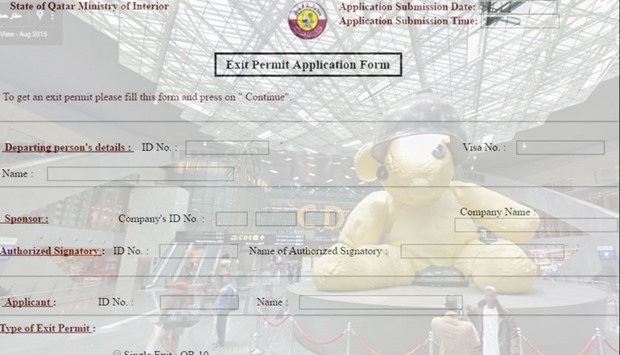The law is effective on the day following the date of its publication in the official gazette, Qatar News Agency said.
According to the amendment, an expatriate worker shall have the right to exit the country for vacation, in case of any urgent circumstance, or any other purpose after informing the recruiter, according to the employment contract. "Also, the foreign worker shall have the right to leave the country permanently before the expiry of the employment contract after informing the recruiter, according to the employment contract. In case of any objection on the exit or departure of the expatriate worker by the recruiter or the department concerned , the expatriate worker shall have the right to petition the exit permit grievances committee , which shall be formed and regulated by a decision of HE the Minister. The committee shall resolve the petition within three working days."
The Exit Permit Grievances Committee was formed on December 12 last year, one day before Law No 21 of 2015 regulating the entry, exit, and residence of expatriates came into force .
Comprising representatives of the National Human Rights Committee (NHRC) and the ministries of Labour and Interior, the Exit Permit Grievances Committee has been set up in accordance with Law No 21 of 2015 that abolished the Kafala system and replaced it with a modernised, contract-based employment system.
While announcing the constitution of the committee, the Ministry of Interior (MoI)'s Legal Affairs Department head Brigadier Salim Saqar al-Muraikhi said the panel would be able to reach a decision on granting travel permits to expatriates within three days after a request is submitted.
"If there is any grievance regarding the committee's decision on granting the travel permit to an applicant, the affected person can lodge a complaint with the Interior minister," Brigadier al-Muraikhi, who is also chairman of the committee said.
The employer is duty-bound to sanction any leave due to the employee which is mentioned in the contract executed between them. The employer is also liable to grant leave to his employee in the event of emergencies, said Brigadier al-Murakhi.
"For an exit permit, the employee only needs to submit an application to his employer as is being done now," he said , adding that in case the employer rejects the application , the affected could make a request to the Grievances Committee, which is now located at the old Traffic Department office in Madinat Khalifa .
"Once the committee receives an application , it will verify if the applicant is facing any criminal case or any charges of financial misappropriation. Then the employer will be contacted and he will be asked to explain the reasons for denying the exit permit .
"If there are no serious complaints pending against the applicant, the committee will grant the travel permit," said the official.
In a statement issued earlier, the Ministry of Administrative Development, Labour & Social Affairs (MADLSA) had said the worker would have the opportunity to contest before the committee any evidence that might have been used against him.
"Further, workers will also have the opportunity to appeal for clemency, in cases where they owe debt but need to return home for a medical or family emergency," it said.

The law is effective on the day following the date of its publication in the official gazette, Qatar News Agency said.
HH the Emir Sheikh Tamim bin Hamad al-Thani issued Law No 1 of 2017 on Wednesday, amending some provisions of the Law No 21 of 2015 regulating the entry, exit, and residence of expatriates.
